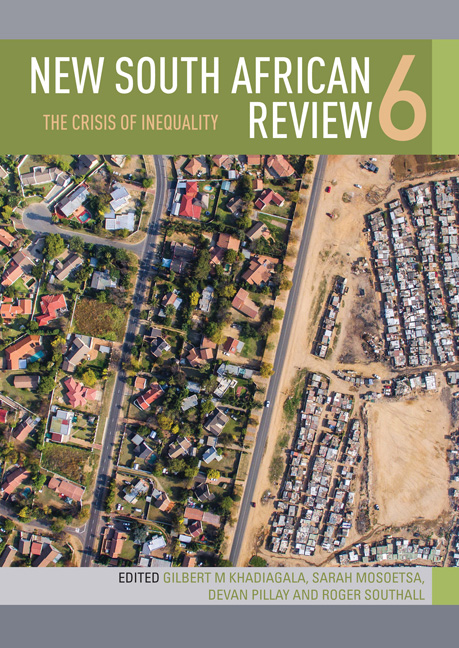Book contents
- Frontmatter
- Contents
- List of tables and figures
- INTRODUCTION: The global crisis of inequality and its South African manifestations
- PART 1 INEQUALITY AND CLASS: POLARITIES AND POLICIES
- PART 2 THE POLITICS OF INEQUALITY
- CHAPTER 5 Liberal democracy, inequality and the imperatives of alternative politics: Nigeria and South Africa
- CHAPTER 6 Liberalism and anti-liberalism in South Africa. Or, is an egalitarian liberalism possible?
- CHAPTER 7 Equality and inequality in South Africa: What do we actually want? And how do we get it?
- PART 3 SOCIAL DIMENSIONS OF INEQUALITY
- PART 4 LAND AND ENVIRONMENT
- Contributors
- Index
CHAPTER 7 - Equality and inequality in South Africa: What do we actually want? And how do we get it?
from PART 2 - THE POLITICS OF INEQUALITY
Published online by Cambridge University Press: 23 March 2018
- Frontmatter
- Contents
- List of tables and figures
- INTRODUCTION: The global crisis of inequality and its South African manifestations
- PART 1 INEQUALITY AND CLASS: POLARITIES AND POLICIES
- PART 2 THE POLITICS OF INEQUALITY
- CHAPTER 5 Liberal democracy, inequality and the imperatives of alternative politics: Nigeria and South Africa
- CHAPTER 6 Liberalism and anti-liberalism in South Africa. Or, is an egalitarian liberalism possible?
- CHAPTER 7 Equality and inequality in South Africa: What do we actually want? And how do we get it?
- PART 3 SOCIAL DIMENSIONS OF INEQUALITY
- PART 4 LAND AND ENVIRONMENT
- Contributors
- Index
Summary
South Africa is heralded for its achievement of formal political equality for all its citizens. Today, however, there seems to be growing discontent with the democratic settlement arrived at in 1994. Two overlapping charges predominate. One is simply that the settlement's noble sentiments are being undermined, intentionally or otherwise, by either or both the political and economic elites. The other suggests that the settlement was drastically incomplete in that, despite the transfer of political power to a majority government, it failed to address the domination of the economy by a white elite.
What is really at stake here is the response to inequality or, more precisely, the extreme level of inequality which continues to characterise South Africa. A host of reports indicate that South Africa has failed to dislodge itself from the unenviable position of being one of the most unequal countries (perhaps the most unequal country) in the world, its Gini coefficient having increased from 0.61 in 1994 to 0.64 in 2014 (IRR 2016: 313). Indeed, the extremes of inequality have increased rather than decreased under democracy. According to Oxfam (2014), whereas in 1993, the richest 10 per cent of the population had a combined annual income of US$36 billion, by 2011 this had grown to US$69 billion. In comparison, the poorest 10 per cent had a combined income of US$1 billion, this remaining constant over the seventeen years. Meanwhile, this gross inequality is heavily racialised, with the rich being overwhelmingly white and the poor almost exclusively black.
The dimensions of this gross inequality are shaped by space, class and gender as well as race. Statistics abound, but in general blacks are far more likely to be unemployed, to live in poverty, to be poorly housed and educated, to have lower life expectancy and, overall, to suffer far more constrained life chances than whites; women, especially black women, suffer more limited life chances than men; and unemployment, poverty and their associated disadvantages are more extreme in rural rather than urban areas, especially in the former bantustans.
Although views vary regarding whether the generous remuneration packages earned by some among the corporate elite are a just reward for globally scarce skills, there is general denunciation of the extremes of inequality. Few politicians, whatever their affiliations, avoid any chance to pledge their commitment to addressing inequality alongside poverty and unemployment.
- Type
- Chapter
- Information
- New South African Review 6The Crisis of Inequality, pp. 135 - 150Publisher: Wits University PressPrint publication year: 2018



